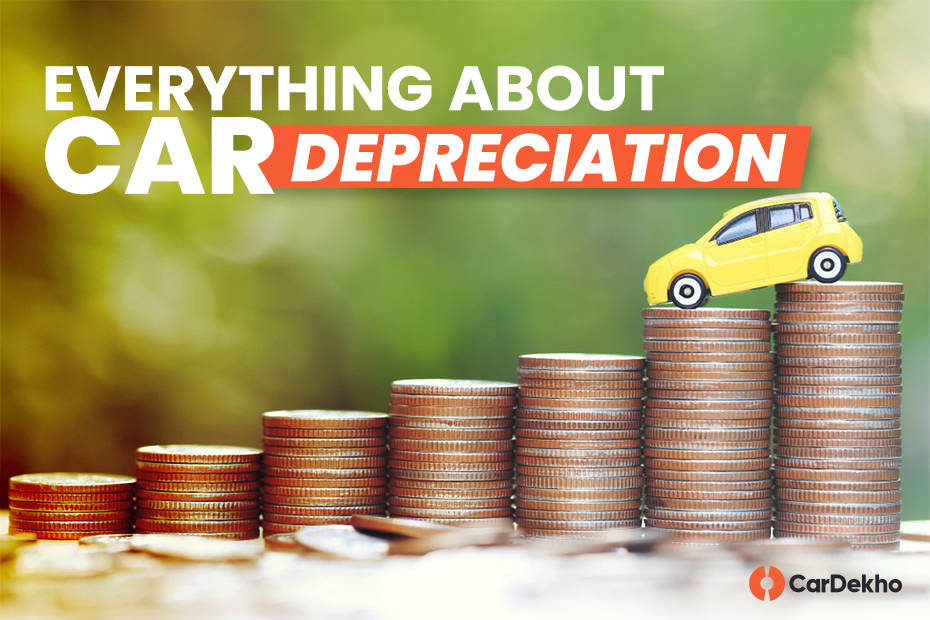Understanding Car Depreciation Rate- How To Calculate And Ways To Minimize
Modified On Jan 02, 2025 03:37 PM By Yashika
- Write a comment
Various other factors beyond depreciation also affects a car’s value

Ever heard of the phrase, ‘Your car loses its value the minute it steps out of the showroom?’ Unfortunately, it is true!
But here’s something to consider: Is your car really an asset? Yes, but a depreciating one! To simplify, an asset is a thing that holds or increases its monetary value over time, such as land, gold, stocks, and more.
A car, however, starts losing its monetary value once it leaves the showroom.
Did you know?
The reduction in the car’s value over the years is called depreciation and the speed at which the value reduces is known as depreciation rate.
In the article, we’ll break down the concept of car depreciation and everything you should know about it.
Why Does A Car Depreciate?
A car depreciates as it is a physical asset that loses its original value due to a combination of factors:
1. Aging / wear & tear

As the vehicle gets older, it gathers miles and experiences wear and tear, impacting its condition and performance. Regular usage leads to degradation of components such as engine, tyres, brakes, interiors, contributing to a decline in car’s value. Scratches, dents, and mechanical/electrical issues also negatively impact a car’s value.
2. Initial depreciation (New Car Effect)

It could be hard to digest, but the depreciation on your car starts when it’s registered in your name and driven out of the showroom. This happens because a brand ‘new’ car immediately becomes a ‘used’ car, which affects the resale value–regardless of the kilometres driven.
3. Advancements in technology

As the new models come equipped with better technology, safety features, and fuel efficiency, the older models become less desirable, accelerating the depreciation.
4. Market trends and demand
A car’s value is also influenced by consumer’s demands and market trends. For instance, SUVs and EVs are currently in high demand, so older body types or less fuel-efficient cars may depreciate faster.
5. Odometer reading

A car's odometer reading is directly related to its market value, as higher number of KMs run indicates greater wear and tear on engine, transmission, and suspension. That said, a car with lower miles is perceived as less likely to require repairs, hence maintaining a higher resale value.
6. Number of owners
The fewer the previous owners, the better a car holds its value. A vehicle that has been passed between multiple owners may indicate potential problems or issues with the maintenance–indicating high depreciation rate.
7. Brand or model
The reputation or the goodwill of the automaker plays an important role in determining the depreciation rate. Reputed brands are known for quality, reliability, and high performance which slows the depreciation as their cars remain desirable in the used car market.
8. Economic & Regulatory Changes
Changes in emission norms, fuel prices, and taxes can also impact a car’s value. For example, stricter emission standards on the diesel vehicles, may reduce the demand for older diesel vehicles, causing them to depreciate faster.
9. Exit of Autobrand
Another key factor is when a car manufacturer exits the Indian market. Brands such as Fiat, Mitsubishi, Ford, and Chevrolet have seen a drop in demand due to ease of availability of its spare parts and long-term maintenance–both of which negatively affects the resale value.
Also Read: Everything You Need To Know About BS7 Norms
Car Depreciation According to Insurance Regulatory and Development Authority of India (IRDAI)
The Insurance Regulatory and Development Authority of India (IRDAI) sets the car depreciation rate used for insurance purposes in India. As per the current guidelines, a car loses approx 15% of its value in the first year, meanwhile a five year old vehicle can depreciate up to 50 % of its original value. To help you better, let’s look at the table below which highlights the fixed depreciation rate slabs as set by IRDAI:
| Age of the car |
Depreciation rate (%) |
| Up to 6 months |
5% |
| 6 months to 1 year |
15% |
| 1 year to 2 years |
20% |
| 2 years to 3 years |
30% |
| 3 years to 4 years |
40% |
| 4 years to 5 years |
50% |
The above given rates determine the car's value which is depreciated over the years. These are used to calculate the Insured Declared Value (IDV) of the vehicle, which represents the maximum sum insured against your vehicle under an insurance policy. That said, it reflects your car’s current market value and serves as the compensation amount in the event of total loss or theft.
Is car depreciation according to IRDAI, a loss?
From a technical perspective, yes!
It reduces the value of your vehicle over time, resulting in a lower claim payout.
From a financial perspective, depreciation is not a direct loss that goes out of your pocket but indirectly reduces the coverage value of your vehicle. For instance, if any part of your car is replaced under insurance, the insurer will pay only the depreciated value of that part, leaving you to bear the remaining cost.
Suggestion: It is advisable to get a zero depreciation car insurance policy to minimize the depreciation associated with your vehicle.
Car Depreciation Under Income Tax Act
Car depreciation under the Income Tax Act, 196, allows taxpayers to claim depreciation as an expense, reducing their taxable income (taxable income=revenue-expense). Here’s the depreciation rate on car as per Income Tax Act:
| Motor Vehicle |
Cars other than those on Hire |
*15% |
*Depreciation is calculated on the written down value (WDV) of the car, which means that depreciation is applied on the reduced car’s value after adjusting for the depreciation claimed in the previous year.
Did you know?
-
Depreciation can be claimed only by the entrepreneurs who use their vehicle for business purposes only. But according to the Income Tax Act, if a vehicle is used for both personal and work purposes, only the proportionate expense for business use can be claimed.
-
If you are a salaried individual, you can’t claim car depreciation unless you have a side business or are self-employed.
Additional Benefits for Electric Vehicles:

-
Electric vehicles (EVs) purchased for business purposes are eligible for a higher depreciation rate of 40% as part of the government's push for EV adoption. Electric vehicles (EVs) purchased for business purposes are eligible for a higher depreciation.
Steps To Calculate Your Car’s Current Value?
Calculating the current value of a vehicle is no rocket science but is an easy math calculation.
According to IRDAI:
Start with the original ex-showroom price and subtract the depreciated value based on the vehicle’s age.
For example, if your car cost you Rs 10 lakh and it's now 3 years old, then according to IRDAI’s given slab, the depreciation rate would be 40% of the vehicle’s cost.
-
Initial cost= Rs 10 lakh
-
Depreciation rate (for slab 3 to 4 years)= 40% of Rs 10 lakh= Rs 4 lakh
-
Current value= Rs 6 lakh (A-B)
According to Income Tax Act:
Here’s a method to calculate car depreciation and its value at the end of each year using the written down value (WDV) method:
Car cost at the end of Year 1: Rs 10,00,000 - Rs 1,50,000 (15% of Rs 10 lakh) = Rs 8,50,000.
Car cost at the end of Year 2: Rs 8,50,000 - Rs 1,27,500 (15% of Rs 8.5 lakh) = Rs 7,22,500.
Car cost at the end of Year 3: Rs 7,22,500 - Rs 1,08,375 (15% of Rs 7.2 lakh) = Rs 6,14,125 and so on.
Ways To Minimize Depreciation On Your Car
Here are some simple steps to minimize car depreciation:
-
Choose resale-friendly vehicles: Opt for reliable and popular brands, common colours, and fuel efficient models.
-
Regular maintenance: Always follow service schedule, keep records, fix damages quickly to avoid further wear and tear.
-
Protect car’s interiors and exteriors: Have your car’s paint protected, use seat covers, protect your tyres and park in safe areas.
-
Get zero depreciation car insurance: Choose for add-ons to avoid losses on replacement of parts, etc.
Also Read: 8 Reasons Why You Should Rotate Your Car Tyres Regularly
Conclusion
Car depreciation is an important factor affecting both sellers and buyers in the automobile industry. Understanding the impact is paramount for making an informed decision. For example, for a buyer, depreciation impacts the affordability of the vehicle, while for sellers, they must consider when pricing their vehicles.
Ultimately, awareness relating to depreciation empowers individuals to get the market knowledge for optimising financial outcomes.
Frequently Asked Questions (FAQs)
-What is car depreciation?
Depreciation on a car is a process in which the vehicle’s value drops down as it ages, collects miles, and dents.
-What causes car depreciation?
Two factors contribute to car depreciation: Market forces and Individual contributions.
-Can my car appreciate in value?
Yes, when the demand is high and the supply of that particular model is low, your car may not depreciate at all or may have its value increased too. For example, Toyota models such as the Innova do not lose their value much owing to Toyota’s reliability. Or even the Octavia vRS - it’s one of those few cars that offered performance in a budget.
-Which cars depreciate faster?
Luxury sedans and electric vehicles (EVs) tend to depreciate faster than other makes and models.
-Does car depreciation help in tax saving?
Yes, depreciation can be claimed as an expense, hence reducing the taxable income.
-What is zero depreciation in car insurance?
Zero depreciation car insurance (or Nil depreciation) is an add-on feature in car insurance that ensures that the insurer receives the full claim amount for repairs or replacements without the effect of depreciation.
1 out of 2 found this helpful









